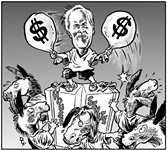Looking for Leadership
Austin's schools are the whole community's concerns
By Michael King, Fri., April 19, 2002

"There is something in Austin's water," declared Austin American-Statesman Editor Rich Oppel a couple of weeks ago, "that makes it hard for people to work together to make progress, raise standards, and enforce any sense of collective purpose -- other than to resist change" ("AISD Needs a Culture Change," March 24).
You might think our Beloved Hometown Editor was referring to his latest wan attempt to redesign his newspaper into something fit for educated adults to read. Alas, no -- BHE was only indulging in one of his periodic impersonations of cartoon duck Mallard Fillmore. Reconsidering the persistent problems of Austin schools, particularly the AISD's failure to improve quickly enough the TAAS scores of minority children, Oppel discovered a predictable villain: the Sixties.
"The overriding culture of Austin schools," Oppel wrote, "remains a classic example of what George W. Bush called 'the soft bigotry of low expectations' during his campaign for president. Austin Independent School District is stuck in a mushy, 1960s liberalism that puts a premium on nurturing children, making them feel good." (And if Mr. Gradgrind-the-Editor has anything to say about it, we'll soon put a stop to that nonsense.)
What silly rubbish.
Since the current occupant of the White House represents the apotheosis of low expectations -- "social promotion" on an epic American scale -- it remains difficult to take him seriously on any subject remotely concerned with education. And like his president, Oppel has no patience either for historical distinctions or simple logic. Blaming "the Sixties" for Austin's school problems is about as accurate as blaming Herbert Hoover for Bush's economic policies -- and no more helpful. Oppel apparently hallucinates troops of superannuated hippies presiding over classroom consciousness-raising sessions ("English is taught ... as a soft, gauzy, 'cultural' experience") when they aren't leading rounds of "Where Have All the Flowers Gone?" If he had bothered to poke his head into a few AISD classrooms -- especially in those schools desperately trying to "raise standards" -- what he would find is revolving hosts of young, inexperienced teachers in overcrowded and chaotic conditions, with small resources, too little training, and less support, doing the very best they can.
So let's all kick them while they're down.
Blunt Instruments
What is all this fuss about? The test scores, of course.
Last fall, the Statesman asked the educational research group Just for the Kids to compare average TAAS scores for school districts across the state, breaking out the averages for low-income and minority students, as it had already done for individual schools. In this highly abstracted version of already dubious numbers -- the Texas Education Agency declines to do such comparisons, believing there are too many variables across districts -- on JFTK's "proficiency" standard (a TAAS score of 85% or higher) Austin ranked last among the 40 largest school districts. The raw numbers are indeed discouraging -- on that at least, Oppel is correct: "In math, only 28% of Austin's eighth-grade, low-income students were proficient, compared with 31% in Dallas, 49% and 38% in two Houston districts, 36% and 45% in two San Antonio districts. In reading, the disparity is the same. For Austin, 42%; Dallas, 47%; Houston's two districts, 58% and 62%; and San Antonio's two districts, 55% and 62%."
But counting a problem is not explaining it. It needs to be pointed out that over the three-year period analyzed by JFTK, Austin students' scores in all these categories did indeed improve -- just not as quickly as in the other districts. Similarly, Austin's overall school rankings under the TEA system, during the same period, have steadily improved.
And just how raw are these raw numbers? Uri Treisman of UT's Dana Center for education research welcomes the attention that JFTK's analyses have brought to Austin's schools. Yet he warns, "State testing programs are pretty blunt instruments: something like a baseball bat with spikes driven into it. They can do a lot of damage -- but they can also clear the way to better things."
Asked if he thought AISD's problem might be "too many hippies in the classrooms," Treisman laughed and answered, "not enough," then turned serious. "AISD has been harmed by turnover and instability in leadership, something like six or seven superintendents in the last 10 years. Volatility in leadership really hurts -- the best districts have stable leadership, and incremental, ecumenical approaches to curriculum across the district."
A Moral Issue
School Superintendent Pat Forgione and the district administration are clearly aware they are in the spotlight, and for now at least are treating the moment as an opportunity. Last week Forgione announced a new initiative for low-performing schools, the "Austin Blueprint," which borrows elements from the Edison and KIPP Academy proposals reviewed by the district earlier in the year: more coordination among teachers and schools, better curriculum alignment, more experienced teachers, more teacher training, greater instructional support. It will begin with six schools (to be announced April 22), and if the program works, AISD will expand it next year. In the shadow of a state budget crisis, Forgione hopes to cobble together district resources -- including a property tax rate soon to reach the statutory $1.50 cap -- with federal funds promised by the No Child Left Behind legislation (that is, if the Bush Administration can be persuaded to budget the programs it previously announced with such fanfare).
Economically, Austin remains a radically divided city, and the state's largest "property-rich" school district in which a growing majority of the students are poor. Indeed, the most effective means of "closing the gap" between affluent and low-income students might well be a citywide living wage. But in the absence of such utopian solutions, Treisman suggests that Austin needs to address directly the challenge of "an incredibly diverse student population in which the parents of advantaged children have been able to capture the most important resources for their kids -- the most experienced teachers." Treisman applauds Forgione's promise to hire teachers with no less than two years' experience for the lowest-performing schools, although he adds, "It should be five years -- it really takes that long to know what you are doing in the classroom. But Austin trains those teachers, and then they get recruited by smaller, more affluent districts.
"It really is a moral issue for the city of Austin," said Treisman. "Which children need our most experienced teachers? How do we get the resources to the children most in need of them? The minority parents realize this, and are demanding it -- I would so like to see a group of white parents saying the same thing: 'We can't wait ...'
"This is what the mayor and the business leaders need to be talking about ... It is more a civil moral issue, than an issue of educational theory."
Or, we can keep right on blaming the victims.
Got something to say on the subject? Send a letter to the editor.








